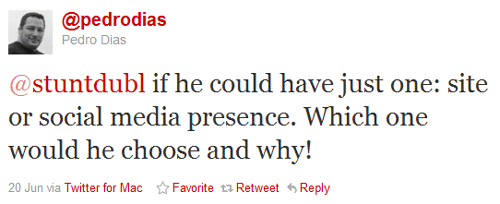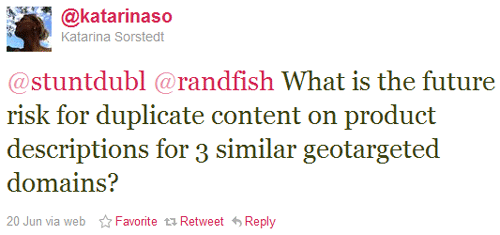
Answers to 4 Excellent SEO Questions
The author's views are entirely their own (excluding the unlikely event of hypnosis) and may not always reflect the views of Moz.
Last week, I visited San Francisco for a number of meetings and got a chance to film some video content for Market Motive with an old friend, Todd Malicoat (aka Stuntdubl). Todd also collected and curated a number of questions from Market Motive folks across Twitter, and, rather than answer in the unacceptably short, 140-character format, I figured I'd do so here on the blog.
I'd always bias to taking the website over the social media presence. It's not that a great Twitter, Facebook, Yelp, Foursquare or LinkedIn account aren't great, it's just that the flexibility, power, branding and measurability of a website has yet to be matched on any platform. With a website, you can custom build virtually any form of analytics, leverage any type of web technology to display/deliver content and control your own destiny. Even if Facebook or some other new, wholly flexible platform allowed for all of these features, you would still never truly own your home on the web.
I'm a huge supporter of and advocate for social media marketing, but I don't think I could ever endorse having your primary base of marketing and acquisition happen anywhere but on a site you fully own and control.
Unfortunately, this is an issue that's fluctuated so much over the past 5 years that I don't feel entirely comfortable giving a solid answer and feeling secure it will be the right one long term.
The current situation is that for Google, most of the time this isn't a problem. You can set up a site in Spanish targeting Spain, another in Mexico and a third in Peru, many with overlapping content pages and so long as the country TLDs are unique (e.g. .es, .com.mx, .pe, etc.) and/or you've separately targeted the sites through Google Webmaster Tools ( more on that topic here), you're relatively safe from duplicate content filtering.
That said, Bing is not nearly as sophisticated on this front (usually), though they are getting better. I don't know how search engines like Baidu, Yandex or Naver might handle this situation, currently - if anyone in the comments has expertise here, please do chip in. Given this, it's often wise to choose either a globally-targeted site OR biuld very customized sites to specific regions (even if there is language overlap). You can always use the cross domain rel=canonical if you want to "share" content between/across sites and self-select which one Google returns.
It depends whether you mean directly or indirectly?
Directly, it will likely be Twitter. Google's ongoing animosity with all things Facebook shows no sign of shifting and thus I'd say it's unlikely Google will start using Facebook signals directly in the results. However... as we showed with correlation data, things that do well on Facebook tend to do quite well on Google, too. Indirectly, the ability to influence a wide network on Facebook, earn lots of shares, comments, likes and activity may indeed lead to very positive and influential second-order effects (links, tweets, positive content analysis signals, etc).
With Twitter, it remains to be seen whether they achieve ubiquity in a wider world. The service is a clear leader in many fields - marketing, politics, technology, investing, media and more - but it's not yet a service everyone's using (~100 million actives vs. Facebook's 750 million). If it sees growth spikes, engagement increases and they become more ingrained in the fabric of "normal" society, then they may indeed be competitive with Facebook for influencing the results, on both first and second-order levels.
The honest answer is that no one really knows. However, I'd strongly suspect the .whatever TLDs(see Mashable's article on the subject for more) will have far more impact on the branding landscape of the web than it will directly in search results, for searchers or for organic marketers. I do have some guesses:
- The new TLDs will become commoditized quickly - $180K is not a big financial hurdle for many medium+ businesses
- The "cool" factor is likely to exist in the tech startup and web-savvy worlds (like a Quora or NameSake), but your cousin in Michigan won't have heard of them and will have trouble using them or believing they work (if they see them in offline advertising)
- They may actually increase the desirability of .com domains as the gold standard everyone's used to and comfortable with
- A few might earn enough brand recognition (as .ly and .us have in the web 2.0 runup) to get some escape velocity and be on par with .info or even .net... But, I wouldn't put money on that :-)
Normally, I'm a huge fan of early adoption in new marketing tactics, but this doesn't feel ROI positive for enough folks to make it a strong recommendation from me, personally. Like everyone else, though, I'll be watching with anticipation to see how it's adopted and used.
Looking forward to your opinions as well, particularly if you have more information to add or feel my answers are mistaken in some way!
p.s. I keep tweeting that I'll put up my blog post on SEO 101 for Travel Bloggers. That post is intense, big and requires a lot of time, so I've had to delay a few times. My new target is next weekend - sorry about that!








Comments
Please keep your comments TAGFEE by following the community etiquette
Comments are closed. Got a burning question? Head to our Q&A section to start a new conversation.